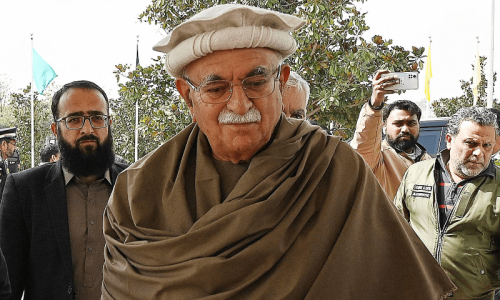ISLAMABAD: With system losses going up to a record 14.4 per cent, the Oil and Gas Regulatory Authority (Ogra) on Tuesday notified about 3pc increase in the sale price of Regasified Liquified Natural Gas (RLNG) for two Sui gas companies effective from Sept 1 owing to higher international prices.
The RLNG’s sale price for Lahore-based Sui Northern Gas Pipelines Ltd (SNGPL) has been increased by 2.76pc to $11.86 per million British thermal unit (mmBtu) at the transmission stage and 2.79pc at the distribution stage to $12.84 per mmBtu.
Likewise, the price for Karachi-based Sui Southern Gas Company Ltd (SSGCL) has been jacked up by 3.07pc to $11.47 per mmBtu at the transmission stage and 3.08pc to $13.36 per mmBtu at the distribution stage. The prices have been revised for September in comparison with August.
The overall increase in terms of amount for SNGPL transmission is 0.32 cents per mmBtu and distribution 0.35 cents per mmBtu and for SSGCL transmission prices have increased by 0.34 cents per mmBtu and for distribution 0.4 cents per mmBtu.
The major reason behind lower RLNG prices for SNGPL despite its larger distribution network and greater distance from ports when compared to SSGCL, according to Ogra’s tariff sheet, is the significantly higher system losses of the SSGCL.
Ogra said the SSGCL’s distribution system losses, commonly described as unaccounted for gas (UFG), stood at 14.36pc when compared to 8.23pc of the SNGPL’s network.
In contrast, the transmission losses for SSGCL have been assumed at 0.12pc and that of SNGPL at 0.38pc.
Ironically, the RLNG distribution prices for SSGCL at $13.36 per mmBtu and for SNGPL at $12.84 per mmBtu are almost $3.64 and $3.12 per mmBtu higher than the delivered price ex-ship (DES), respectively. This is mainly because the LNG importers — PSO and PLL — also charge profit margins on account of retainage and margins at the rate of 3.15pc and 3.1pc of DES price, respectively, on top of 8.6pc losses of SNGPL and14.5pc losses of SSGCL.
The basket RLNG price was based on a total of 9 cargoes, eight under the two LNG contracts with Qatar and another from a private supplier – also under long term contract – and was worked out at $9.76 per million British thermal unit (mmBtu) at import stage – delivered ex-ship (DES).
This included the cost of LNG delivery ex-ship of five cargoes from Qatar under the first LNG contract worked out at $10.71 per mmBtu at the rate of 13.37pc of Brent. The cost of three cargoes under the second contract also from Qatar were priced DES at $8.17 per mmBtu at the rate of 10.2pc of Brent. Another cargo imported by Pakistan LNG Ltd (PLL) was priced at $9.72 per mmBtu as it is indexed at the rate of 12.14pc of Brent.
Ogra said it had increased the prices in line with policy guidelines issued by the federal government through the Ministry of Energy.
It may be noted that LNG’s basket price in May last year had touched a record $22-24 per mmBtu owing to a string of spot cargos procured by then PDM’s coalition government in the first month in office to meet energy shortages. Since then, repeated efforts to import more gas through spot tenders have remained futile owing to tight supply conditions and record prices in the international market following the Russian-Ukraine war. As such, all the nine cargoes in September are available to Pakistan under long-term contracts, mostly with Qatar, except one from another supplier.
The average sale price for Lahore-based SNGPL stood at $21.83 per mmBtu in May last year. Likewise, the average RLNG sale price for Karachi-based SSGCL stood at $23.79 per mmBtu in May 2022. Pakistan has two long-term contracts with Qatar, one involving 5-6 cargoes at 13.37pc of Brent signed by the previous PMLN government in 2015 and 2-3 cargoes contracted by the PTI government in 2019 at 10.2pc of Brent.
It may be recalled that the average cost of six long-term contract cargoes of PSO-Qatar stood at $5.78 per mmBtu in December 2020.
The average LNG-based power generation cost is the second most expensive after furnace oil-based plants. LNG-based fuel cost of electricity stood at Rs24.43 per unit compared to Rs28.72 per unit on furnace oil.
Published in Dawn, September 13th, 2023















































Dear visitor, the comments section is undergoing an overhaul and will return soon.